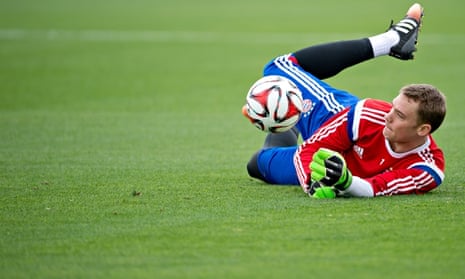In almost all sports, there is a handy way to determine who is the best: the result. People may prefer one style of play to another or think one side performed better, but that is subjective and not what is being measured.
The identity of a team sport’s finest player is also besides its point. Each of the three finalists for the Ballon d’Or in Zurich on Monday has a legitimate claim on the title, each raising interesting questions about how football is to be evaluated. In 58 years, only once has a goalkeeper been chosen – the Russian Lev Yashin in 1963.
The presence of Manuel Neuer prompts us to wonder if ever it makes sense to present the trophy to a man who occupies a position peripheral to most of what happens on the pitch – all the more so, given the unique talents and astounding feats of Lionel Messi and Cristiano Ronaldo.
Majestic though Neuer is, his propensity to charge from goal in order to hack clear, make a tackle or play a simple pass is not as revolutionary or compelling as the technical innovations and goalscoring of his rivals.
Neuer’s Bayern Munich cruised to the title in Germany, conceding just 23 goals, and also won the German Cup, Super Cup and World Club Championship, while Germany are world champions.
Still, though, it is hard to escape the reality that, thanks to the brilliance of his team-mates, the majority of domestic games were not close contests, nor was he a transcendent force in Brazil, in the manner of Peter Schmeichel at the 1992 European Championship. But Neuer is without doubt the world’s best in his position, excelling at the essentials and interpreting his role differently to anyone else; perhaps that is enough.
Otherwise we are left once more with Messi and Ronaldo. Reduced to the numbers – which can never do them justice, yet are the only way we can make sense of their geniuses – they are similar. In 66 games Messi scored 58 goals and created 21, Ronaldo managing 61 in 60, creating 22.
Those who consider Messi the superior player will argue that even not at his best he is the best, and there is traction here. Ronaldo’s goals tally is augmented by more penalties, and though 2014 was not his most dominant year, in it, Messi remained the world’s most skilful and uncontainable attacker. But he could not inspire Barcelona to a major trophy and was neutralised in the World Cup’s closing stages. On that basis it is hard to justify his award.
Ronaldo was prolific in the Champions League knockout rounds. In the semi-final, his speed and nous was instrumental in Real Madrid’s home defeat of Bayern Munich. He scored twice in the return and then seized a late penalty in the final – no more than he merited for his earlier endeavours.
He was the most significant factor in cementing his team as the world’s best; ultimately, the point of the entire enterprise.
Ireland’s Stephanie Roche is one of three nominees for the Puskas goal of the year award, a remarkable effort scored for Peamount United against Wexford Youths.
Her rivals are Robin van Persie and James Rodríguez.
